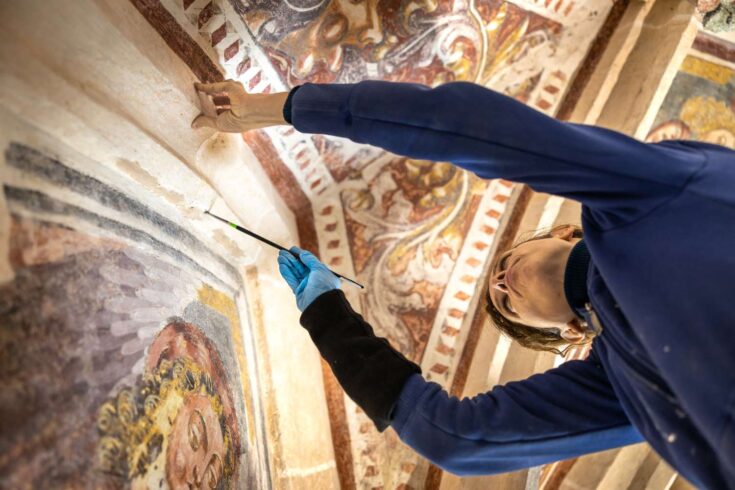When you hear the term ‘technician’, which sector do you think about? I would guess that it’s not the arts and humanities.
Yet the arts and humanities research ecosystem couldn’t function without the skills and expertise of technology and skills specialists, sometimes referred to as ‘Research Technical Professionals’ (RTPs, in short) or simply ‘technicians’. Their contributions to research and innovation aren’t always sufficiently valued and visible. Sometimes they are literally behind the scenes, for example, sound engineers or costume and set designers in performing arts research.
A new study shines a light on the technical experts working with arts and humanities researchers and their invaluable contribution to research.
The community
In 2022, the Arts and Humanities Research Council (AHRC) commissioned a study from Melian Dialogue Research Limited. Its objectives were to:
- explore the challenges of identifying arts and humanities research technical professionals and developing an inclusive definition
- map the research technical professionals’ community contributing to research in AHRC’s remit, and their contributions to the arts and humanities research landscape
- explore how AHRC can address the four pillars of the Technician Commitment
- highlight the skills requirements and development needs of this group
- increase our understanding of equality, diversity, and inclusion issues affecting this group
- provide AHRC with recommendations on how to champion the value of technical staff in our research community
A survey was launched and promoted online in mid-2022, followed by 13 in-depth interviews and seven focus groups with 20 participants.
The study itself has its limitations, not least because of difficulties in defining technicians as a coherent part of the arts and humanities ecosystem. This is evident in the overall response rate to the survey and in the lack of diverse representation.
Yet this in itself shows the need for improvement, and AHRC as part of UK Research and Innovation (UKRI) are committed to delivering meaningful change. The Technician Commitment is a sector-wide community initiative we support, and UKRI is a signatory to it.
The study tells us that arts and humanities technical professionals do not see themselves as part of a community. This may be in part because of the diversity of technical roles needed for arts and humanities projects. The list of job titles of the respondents ranges from an Agile Delivery Manager and Antiquarian Cataloguer to Textile Conservator and User Experience Designer (see page 47 of the report).
When respondents were introduced to the term ‘Research Technical Professional’, some of them recognised that they were part of a wider group which could have a strong voice if it was connected – and acknowledged as such. In the words of one of the participants of the focus groups: ‘The question should be, how are we looked at and perceived by others?’.
We worked very closely with our study team at Melian Dialogue Ltd to ensure the design and delivery of the study would yield useful, robust evidence. Geographically, research organisations in higher education and beyond from across the UK have been represented but the breakdown of the respondents based on protected characteristic is not as broad as we were hoping for.
The literature review didn’t provide comprehensive contextual evidence as there aren’t yet any publications which would focus on the whole community of technicians in the arts and humanities in the UK research ecosystem. Resources about its sub-communities, such as the 2021 Research Libraries UK report in partnership with AHRC, ‘The role of academic and research libraries as active participants and leaders in the production of scholarly research’, are few and far between.
A need for improvement
It is challenging to engage with and advocate for a group which doesn’t have a collective identity, recognition, and representation. Yet the study allowed us precisely this kind of engagement.
It also provided evidence that many technicians in the arts and humanities face barriers in terms of career development and progression, such as:
- the focus on written research outputs
- the lack of visibility in the arts and humanities academic publishing (as naming technicians as co-authors on research publications isn’t wide-spread practice)
- insufficient acknowledgement of technicians on AHRC-funded projects and other projects
- lack of dedicated funding schemes where RTPs could lead a research project
- unsatisfactory salary levels and a lack of opportunities for promotion without either achieving an academic qualification, such as a PhD, or taking on additional managerial duties on the top of the technical ones
On a positive note, 95.4% of the survey respondents said that their employees were encouraging or facilitating Continuous Professional Development (CPD). However, once their capability is enhanced by CPD, arts and humanities technicians often find it hard to achieve a promotion because of the small number of vacancies at their place of employment or in the wider sector.
The conclusion from the study is that support from various stakeholders in the ecosystem, from employers to funders, is needed to enable the arts and humanities research technical community members to maximise their research effectiveness, improve opportunities for career development, and therefore enhance both their wellbeing and their contribution to the arts and humanities.
How AHRC supports the technical community
AHRC has already started activities designed to remove some of these barriers. We launched the AHRC-RLUK Professional Practice fellowships scheme and updated our research funding guide to emphasise the definition and value of research technical specialists.
We continue to engage in the cross-UKRI work to implement the Technicians Commitment, through contributing to the revised UKRI people and teams action plan, which seeks to embed incentives for supporting technical careers in our funding policies, and through our work with the Technician Commitment team, TALENT programme and support for the recently announced Institute for Technical Skills and Strategy.
We would love to hear from you if you are in a technical role in the arts and humanities research. Please email us at enquiries@ahrc.ukri.org to share your story.




